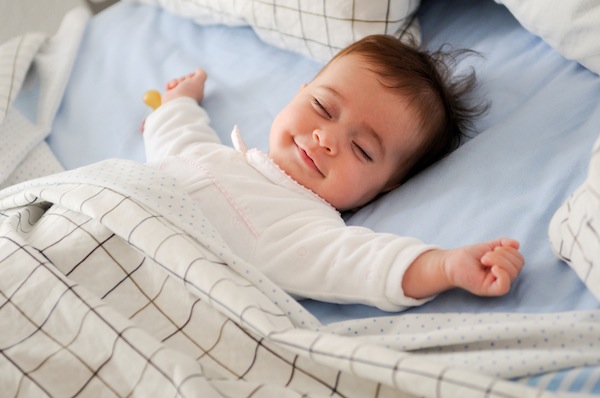
It may not always seem this way, but our kids are built to sleep. Good sleep is natural—it’s hard wired in our little ones’ brain stems, and unfolds organically over the first several months.
The real trick (and biggest predictor of good sleep over time) is following our kids’ unfolding sleep abilities so they can do what comes naturally to them: fall asleep independently and sleep well throughout the night and for naps.
It only makes sense that we can use the science of sleep and child development to help us pave the way to peaceful nights. As parents, if we follow these science-based ideas, we set the stage for the best sleep possible.
1. Dark Like a Cave
Science tells us that our brains are activated by light; light tricks the brain and tells us it’s time to be awake. Gradually dimming the lights during bedtime and naptime routines is a good place to start telling the brain it’s time for sleep. And what’s crucial is creating a truly dark room for your little one to sleep. It makes an enormous difference and is worth the trouble. We often notice during sleep consults in homes that parents think they have a dark room for their baby, but it’s not even close.
2. Cooler than You Think
Babies and kids sleep best in a cool room; the optimal temperature is 65-68 degrees. Babies in a cool room sleep longer and wake less often. The good news is that this also meshes perfectly with the American Academy of Pediatrics’ recommendation for optimal temperature for SIDS prevention. Your little one may need a blanket sleeper over their cotton pjs, but be careful not to overdress. Don’t worry too much about chilly hands or noses; you can slip your hand down their chest or back to see how warm they are. If they’re sweaty, take a layer off.
3. The Internal Clock
The circadian system tells our brain whether it’s day or night and when it’s time to go to sleep in the evening. This fabulous internal clock matures by the age of roughly 6 months. The best way to harness this powerful system to help with sleep is by holding an early and regular bedtime for our babies and kids. Making sure bedtime is very consistent (we call 7pm the “magical” bedtime), makes falling asleep much easier.
4. Sleep Pressure Builds
Tiny little babies can only stay awake for 60-90 minutes at a time before the pressure to sleep builds and they are ready for a nap or bedtime. As our kids grow, this sleep pressure builds more slowly. This sleep drive is also called the homeostatic system (it works together with the circadian system to organize sleep) and we can use it to set the stage for optimal sleep. One of the biggest mistakes parents make is keeping their kids up longer, thinking they’ll fall asleep more easily. The opposite is true. A great way to use this science is the “90 minute awake span” strategy when babies are 2-5 months old, to help parents know when it’s time for the next nap.
5. The Pattern Seeking Brain
Science tells us that baby brains are like little anticipation machines. They seek, detect, and test patterns more than adults do. This is why routines and consistency help so much. Start your bedtime routine at least 45 minutes before bedtime. Dim the lights, put soft music on and ease into evening together. Read books and sing songs you both love and maybe add in a little “child led play,” which helps little brains shift into self-regulation mode—perfect for falling asleep. Once your little one is at least 5 months old, a consistent pattern of response from you at sleep times is also key to baby accessing her fabulous natural capacity to self soothe and sleep well.
All of these science tips are backed by sound research, and experience has shown us that they really do produce naturally good sleepers. Here’s to a good, long, happy night of sleep for the whole family.
Julie Wright, MFT and Heather Turgeon, MFT are the authors of The Happy Sleeper, The Science-Backed Guide to Helping Your Baby Get a Good Night’s Sleep – Newborn to School Age.


























